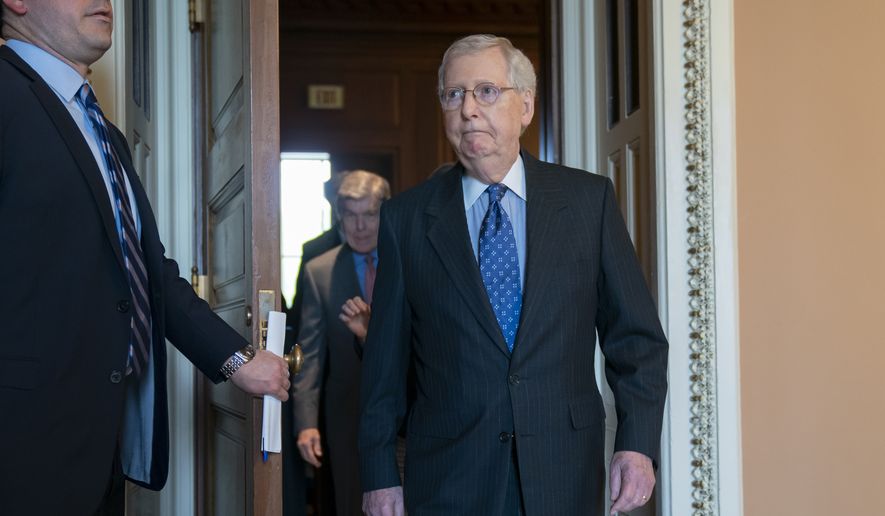Senate Majority Leader Mitch McConnell declared the Trump-Russia investigation “case closed” on Tuesday, but said Democrats are refusing to accept it — and playing into Russia’s hands.
The Kentucky Republican opened the Senate floor with a fiery speech accusing Democrats of “an absolute meltdown” after the facts of special counsel Robert Mueller’s report didn’t go their way, so they turned their attention on Attorney General William P. Barr, smearing him with “baseless” accusations of perjury and “laughable” threats of impeachment.
“They seem to be angrier at Bill Barr for doing his job than they are at Vladimir Putin,” Mr. McConnell said.
The Senate leader said he felt compelled to speak after watching the way Democrats reacted to the special counsel’s report, rejecting the fundamental conclusion that Mr. Mueller did not find a conspiracy between President Trump and Russia to subvert the 2016 election.
“This ought to be good news for everyone. But my Democratic colleagues seem to be publicly working through the five stages of grief,” he said. “The first stage is denial.”
Mr. McConnell had been one of the staunchest GOP defenders of Mr. Mueller over the last two years, repeatedly batting back Mr. Trump’s complaints of bias and “witch hunt” and saying the special counsel needed to be allowed to finish his work.
But the senator said Democrats built Mr. Mueller into something more in their minds — a “secular saint, destined to rescue the country” from its own choice in the 2016 election. When Mr. Mueller declined to do so, they couldn’t believe it, Mr. McConnell said.
He said they’ve moved from denial to anger, the second stage of grief, using what he called a “perpetual outrage machine.”
Mr. McConnell said he hopes Democrats quickly speed through the other stages of anger — bargaining and depression — and get to acceptance, so the country can move on.
“Case closed,” he said.
Democratic leaders balked at that conclusion.
House Speaker Nancy Pelosi and Senate Minority Leader Charles E. Schumer issued a joint statement calling Mr. McConnell’s speech “a stunning act of political cynicism,” and accused him of breaking his oath of office.
“On every issue that matters in people’s lives, the administration and a complicit Republican Senate are waging an unprecedented, unwarranted, unconstitutional and utterly dangerous campaign of stonewalling,” the two leaders said.
They also speculated on “a dark connection” between Mr. Barr, Mr. Trump and Mr. McConnell.
In separate remarks on the Senate floor, Mr. Schumer said Mr. McConnell was attempting a “whitewash” of Mr. Trump’s behavior.
“Of course he wants to move on. He wants to cover up. He wants to silence,” the New York Democrat said.
The exchanges of rhetorical fire showed just how little Mr. Mueller’s report — supposed to be the last word — has actually settled.
Mr. McConnell said if there is one thing the report should prove, it’s that Democrats were slow to recognize the dangers of an aggressive Russia under Mr. Putin.
He pointed back to then-President Barack Obama’s mocking Mitt Romney, his 2012 GOP presidential opponent and now a sitting senator, for saying Russia was the biggest threat to the U.S. Mr. Obama at the time called that a foreign policy stolen from the 1980s.
The senator drew a line from that view to the Obama administration’s haphazard handling of Russian efforts to meddle in the U.S. election.
“Many of us now see President Obama’s approach to Russia could have used more 1980s, more Ronald Reagan, and less Jimmy Carter,” Mr. McConnell jabbed.
Mr. Schumer bristled at those attacks.
He said if Republicans are serious about Russian meddling they’ll pass more election security legislation and impose more sanctions on Mr. Putin’s government.
Where Mr. McConnell focused on Mr. Mueller’s work undercutting theories of “collusion” between the Trump campaign and Russian operatives, Mr. Schumer focused instead on the second part of the special counsel’s work finding nearly a dozen instances where Mr. Trump’s behavior could be seen as attempts to obstruct the Russia investigation.
Mr. Mueller declined to recommend prosecution, though, leaving both sides arguing over what his work means.
• Stephen Dinan can be reached at sdinan@washingtontimes.com.




Please read our comment policy before commenting.